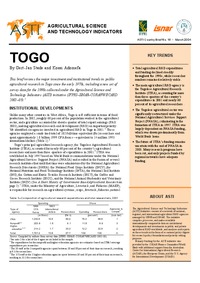Authors:
Stads, Gert-Jan; Adomefa, Kossi
Year:
2004
Publisher
International Food Policy Research Institute (IFPRI); International Service for National Agricultural Research (ISNAR); and Togolese Agricultural Research Institute (ITRA)
Back to:
With rising numbers of researchers in the higher-education and nonprofit sectors and falling numbers in the government sector, total agricultural researcher numbers in Togo remained relatively unchanged throughout the 1990s. Agricultural research funding—and consequently spending—fell steadily.
ITRA was created in 1997 through the amalgamation of several smaller institutes. 2001 funding to ITRA by the national government, however, was significantly lower, in real terms, than funding to its predecessors 10 year earlier, leaving ITRA largely dependent on other sources of income. PNASA—a project funded by World Bank loans, counterpart funding from the Government of Togo, OPEA, Japan, and UNDP—contributed greatly to the institute’s budget, but shortfalls and delays in the disbursement of counterpart funding resulted in repeated suspension of the project and ultimately to severe disruption of research activities. Other planned funding from producer organizations and the private sector was also not forthcoming, and in March 2003 PNASA officially concluded.
Currently, only the projects financed by regional research networks have adequate levels of funding. As of 2004, ITRA falls under the umbrella of the State budget, which will hopefully result in increased government contributions and alleviate the institute’s heavy reliance on donor funding.
Despite these difficulties and the relatively small size of its agricultural R&D system in terms of research expenditures and researcher numbers, Togo’s expenditures per agricultural researcher and the qualification levels of researchers are above the West African average.

